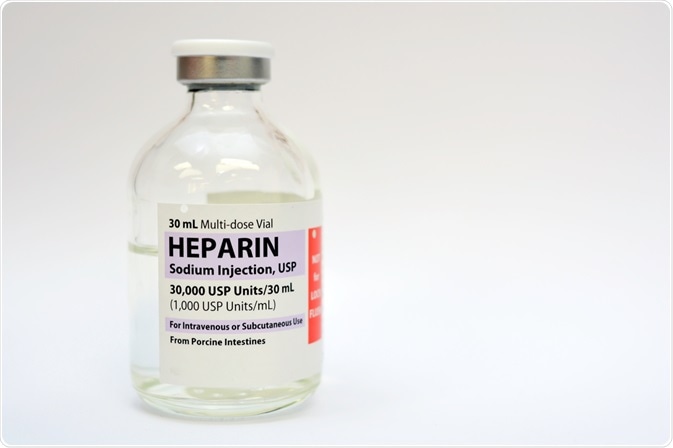Heparin is an injectable anticoagulant that is used to prevent the formation of blood clots in the vessels. It is a highly-sulfated glycosaminoglycan and the most highly negatively charged biological molecule known to mankind. It is also used to create an anti-clotting surface inside various medical devices such as renal dialysis machines and test tubes.
Pharmaceutical-grade heparin is derived from the mucosal tissue of animals that have been slaughtered for meat such as pigs and cattle. Research conducted between 2003 and 2008 eventually led to the synthetic development of low molecular weight heparins in 2011.

Image Credit: AlteredR / Shutterstock
Heparin uses
Anticoagulants work by decreasing the clotting ability of the blood, helping to prevent the formation of clots as well as stopping the further expansion of any existing clots. Although heparin does not break down existing blood clots, it does enhance the body’s natural mechanism involved in clot lysis.
Heparin is used to manage and treat blood clots that may occur in the heart, legs and lungs. The drug is also used to stop the blood from clotting after surgery, during blood transfusion, during kidney dialysis or while blood is being collected in a sample pot. Heparin increases the level of an anti-clotting protein in the blood, which keeps the blood flowing smoothly.
Further details of the conditions for which heparin use may be indicated are given below:
- Blood clotting disorders
- Blood clot in the lung
- Prevention of blood clot in the lung
- Peripheral artery obstruction
- Prevention of peripheral artery thromboembolism
- Blood clot in a deep vein
- Prevention of deep vein thrombosis
- Heart attack
- Prevention of blood clot following percutaneous coronary intervention
- Acute syndrome of the heart
Precautions
When deciding on whether to use heparin, physicians must weigh up the health benefits to the patient against the risks associated with the drug. This involves taking the following points into consideration.
Use in pediatrics – No studies have yet indicated that heparin is associated with any pediatric-specific conditions. However, heparin preserved with benzyl alcohol should not be used as this substance has been associated with adverse events and death in pediatric patients. When its use is indicated, heparin that is preservative-free should be administered.
Use in geriatrics – No studies have suggested any problems among the elderly that would specifically limit the use of heparin in this age group. However, older individuals, particularly females aged over 60 years, are at a greater risk of developing bleeding disorders and dose adjustment may be required.
Use in pregnancy – For all trimesters of pregnancy, heparin has been classed as a category C drug by the Food and Drugs Administration. This means there is insufficient data available on the use of the drug in human pregnancy. However, heparin does not cross the placenta and is the drug of choice for pregnant women in cases where an anticoagulant is considered absolutely necessary.
Breastfeeding – Studies suggest that heparin does not pass into the breast milk and poses little risk when administered to women who are breastfeeding.
Allergy – Heparin can trigger a severe form of allergic reaction called anaphylaxis and physicians need to check whether patients suffer from any allergy to heparin, other medications or anything else such as certain food items.
Other health conditions – The presence of other health disorders can affect the choice to use heparin and doctors need to be aware if a patient has any of the following conditions:
- Bleeding disorders such as hemophilia
- Bacterial endocarditis
- High blood pressure
- Liver disease
- Heavy or unusual menstruation
- Stomach or intestinal disorder
- Active bleeding
- Thrombocytopenia
Smoking status – Smoking lowers the levels of heparin in the blood and physicians need to be aware if a patient is a smoker or has only recently stopped smoking.
Drug interaction – There are various other medications that heparin should not be used in conjunction with, due to the effects of drug-to-drug interactions. These interactions can alter how a medication works in the body and potentially lead to severe side effects. Doctors need to be made aware of any prescription or non-prescription drugs a patient may be taking when they are planning to start heparin. Even pain relievers need to be checked because they often contain non-steroidal anti-inflammatory drugs (NSAIDs) such as aspirin, which can increase the risk of bleeding when used in combination with heparin.
Salt intake – Heparin contains sodium and doctors should be made aware if patients are on a salt-restricted diet or have a condition that could be worsened by salt intake, such as congestive heart failure.
Side effects
In some cases, the use of heparin can cause new blood clots to form while patients are taking the medication or after they have stopped taking it. Patients should immediately stop using heparin and seek medical attention if they experience pain in the chest, groin or legs; have difficulty breathing; suddenly develop a painful headache or experience a loss of coordination or any visual disturbances.
Heparin can cause bleeding if the effect the drug has on clotting proteins is too strong. Patients should notify their doctor if they experience any signs of serious bleeding such as prolonged bleeding in the gums or from cuts; persistent nosebleeds; heavy or prolonged menstruation; dark urine; propensity to bruise easily; black stools; dizziness or severe headache.
The risk of stomach bleeding is increased by regular alcohol consumption. Patients should limit the amount they drink and check with their doctor regarding how much alcohol is safe to drink.
Further Reading
Last Updated: Feb 23, 2023